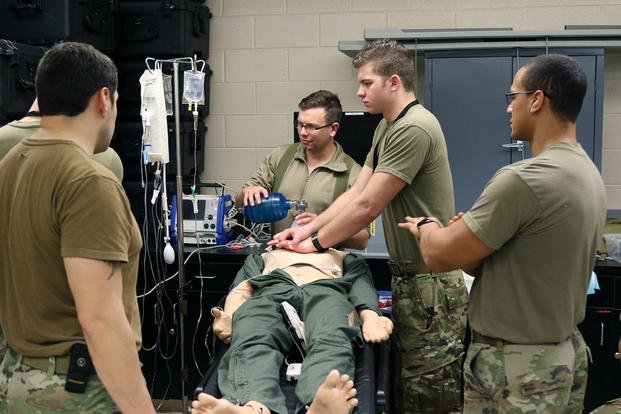The Joint Special Operations Medical Training Center (JSOMTC) is an Army-run medical school with a Navy Special Warfare component at Fort Bragg, N.C., home of Army Special Operations. Army Combat Medics, Ranger, SOAR flight medics, Civil Affairs medics, Special Forces medics, and Navy SARC, SEAL and SWCC medics attend the Special Operations Combat Medic Course (SOCM) of instruction for their next-level training to becoming a Special Operations combat medic. The Navy detachment component of the JSOMTC is called the Navy Special Operations Medical Institute (NSOMI).
Who attends SOCM?
Army combat medics: Army combat medics (68W) who also have completed Army Basic Airborne Course and Ranger Assessment and Selection Program (RASP) and become members of Ranger Battalions will attend SOCM. SOCM-qualified medics are assigned to the 75th Ranger Regiment (Ranger Medic), 160th Special Operations Aviation Regiment (SOAR Flight Medic), 96th Civil Affairs Battalion (CA-Med SGT), Special Operations Support Command and in direct-support positions of these U.S. Army Special Operation Command (USASOC) positions.
Army Special Forces medic (18D): The SOCM course is six months long and trains trauma. The second half that 18D's go to is another five months and trains on medical problems. For a total of 322 days, the 18D is learning the advanced skills of the trade. Navy Special Warfare and SARC/MarSOC SOCM qualified medics, as advancement to their training also can attend the final stage of the 18D course.
Navy SEAL and SWCC medics: Courses available for Navy personnel are the Special Operations combat medic for Navy Corpsman (HM) and medically trained designated Special Operators (SO) and Special Warfare Combatant Craft Crewmen (SB). Now all SEALs and SWCC are SO or SB ratings. However, those interested in becoming medically qualified are eligible for the SOCM course of instruction. The SEALs and SWCCs will keep their SO and Sb ratings, but operate in the units as the combat medic.
RECON corpsman: Also known as SARC (Special Amphibious Reconnaissance Corpsman). SARCs are beginning to be utilized in almost all USSOCOM assets when the need for a SOCM-qualified combat medic is required. SARCs are Recon Marine-trained, having attended the Basic RECON Course, SERE Training, Special Operations Dive School, Jump School, Military Free Fall, and other Special Operations schools and training on their resume. SARCs are very much an integral part of the USMC RECON platoons.
The Force Reconnaissance Corpsman receives NEC-8427 upon completion of SOCM. As their career advances, they also may select to become an independent duty corpsman (IDC) after completing the Special Operations IDC course and be awarded the NEC 8403, Fleet Marine Force Reconnaissance independent duty corpsman.
MarSOC hospital corpsman: Should a Navy corpsman complete MarSOC Assessment and Selection, they also will be deployed with Marine Special Operations Command (MARSOC). SARCs will augment into Naval Special Warfare and Army Special Forces units when medical assistance is needed due to their highly advanced skills in combat trauma care and diving medicine.
What do you learn at SOCM?
SOCM is a 36-week course of instruction that focuses on training enlisted Army medics (68W), Navy corpsman (HM) and other Special Operations medically designated members to advance their skill set for various Special Operations communities.
The SOCM course is designed to teach the Special Operations combat medic about combat trauma management and tactical combat casualty care (TCCC), which enables medics with the skills to handle those wounded in combat from their initial point of injury through evacuation.
The SOCM-trained medic often will be the closest thing to a doctor or dentist that rural villages around the world have seen. The SOCM also learns skills that enable them to prescribe appropriate treatments for disease.
Completing the SOCM course certifies students as National Registry EMTs. They also are qualified in basic life support, pediatric education for pre-hospital providers and advanced cardiac life support.
How is SOCM different from the 18D Special Operations medics course?
The SOCM course is the first half of the 18D training pipeline. Army Special Forces 18D medics get additional training to the SOCM course. The second half of the 18D pipeline covers significant amounts of formal training in:
- Dive medicine
- Altitude physiology
- Large animal veterinary care
- Holistic medicine
- Ritualistic and herbal remedy
- Superstition and cultural peculiarity
- Dental extraction
- Orthopedics
- Advanced trauma life support
From the Army Special Forces recruitment pages: The Army Special Forces 18D medical sergeants specialize in trauma management, infectious diseases, cardiac life support and surgical procedures, with a basic understanding of veterinary and dental medicine. Both general health care and emergency health care are stressed in training. Medical sergeants provide emergency, routine and long-term medical care for detachment members, associated allied members and host-nation personnel; establish field medical facilities to support unconventional warfare operations; provide veterinary care; prepare the medical portion of area studies, brief backs, and operation plans and orders.
Typical job duties:
- Provide initial medical screening and evaluation of allied and indigenous personnel
- Provide examination and care to detachment members
- Supervise medical care and treatment during missions
- Operate a combat laboratory and treat emergency and trauma patients
- Develop and provide medical intelligence as required
Special forces medical sergeants are some of the finest first-response/trauma medical technicians in the world. Though they are trained primarily with an emphasis on combat/trauma medicine, they also have a working knowledge of dentistry, veterinary care, public sanitation, water quality and optometry.
Stew Smith is a former Navy SEAL and fitness author certified as a Strength and Conditioning Specialist (CSCS) with the National Strength and Conditioning Association. Visit his Fitness eBook store if you're looking to start a workout program to create a healthy lifestyle. Send your fitness questions to stew@stewsmith.com.
Want to Learn More About Military Life?
Whether you're thinking of joining the military, looking for fitness and basic training tips, or keeping up with military life and benefits, Military.com has you covered. Subscribe to Military.com to have military news, updates and resources delivered directly to your inbox.




















